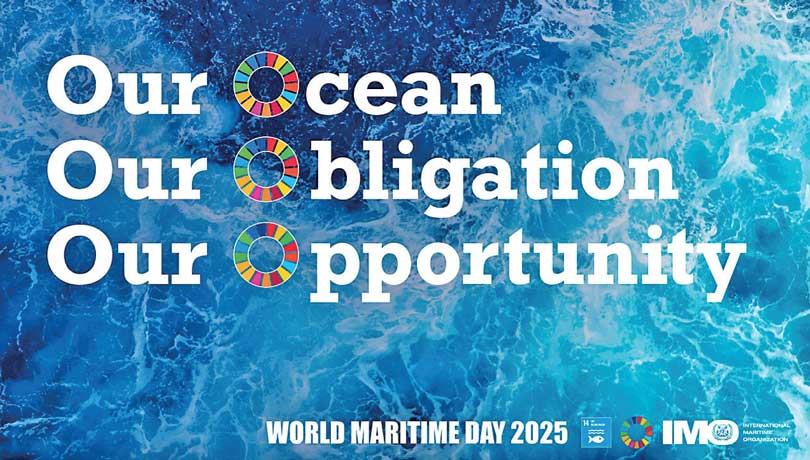Monday Feb 23, 2026
Monday Feb 23, 2026
Thursday, 25 September 2025 14:04 - - {{hitsCtrl.values.hits}}

 World Maritime Day, initiated by the International Maritime Organization (IMO), is observed annually to recognize the indispensable role of maritime transport in facilitating global trade, driving economic development and advancing sustainable progress. As more than 80 percent of the world’s goods are transported by sea, shipping remains the lifeline of globalization. The 2025 theme “Our Ocean, Our Obligation, Our Opportunity” serves as a timely reminder of the collective responsibility shared by governments, industry actors and civil society to safeguard the oceans while ensuring that maritime transport continues to serve as a foundation of global connectivity and prosperity.
World Maritime Day, initiated by the International Maritime Organization (IMO), is observed annually to recognize the indispensable role of maritime transport in facilitating global trade, driving economic development and advancing sustainable progress. As more than 80 percent of the world’s goods are transported by sea, shipping remains the lifeline of globalization. The 2025 theme “Our Ocean, Our Obligation, Our Opportunity” serves as a timely reminder of the collective responsibility shared by governments, industry actors and civil society to safeguard the oceans while ensuring that maritime transport continues to serve as a foundation of global connectivity and prosperity.
This theme is particularly relevant in the context of current maritime challenges: technological disruption, environmental sustainability imperatives and shifting trade patterns influenced by geopolitics and climate change. It emphasizes not only the duty to preserve ocean resources but also the opportunities arising from innovation and cooperation in the maritime sector.
The Ocean as a Shared Global Commons
Oceans cover over 70 percent of the Earth’s surface and play a critical role in climate regulation, biodiversity preservation, and human livelihoods. Beyond their ecological value, oceans are integral to global commerce, with seaborne trade forming the backbone of international supply chains. Ports, shipping routes and maritime logistics networks collectively sustain the flow of energy, food, raw materials and manufactured goods across continents.
However, the oceans are under unprecedented stress. Rising sea levels, ocean acidification, and plastic pollution are threatening marine ecosystems. Shipping contributes significantly to global greenhouse gas emissions, accounting for nearly 3 percent of the total, with projections indicating continued growth unless urgent decarbonization measures are adopted. Recognizing the ocean as a shared common, the 2025 theme highlights the imperative for collective stewardship to balance exploitation with preservation.
Obligation: Safety, Environmental Protection and Governance
The term “Obligation” reflects the ethical, regulatory, and operational responsibilities of maritime stakeholders. Safety has historically been the foundation of shipping, reinforced by conventions such as the International Convention for the Safety of Life at Sea (SOLAS) and the International Convention for the Prevention of Pollution from Ships (MARPOL). While safety remains foundational, the scope of obligation now extends to include decarbonization, digitalization and social responsibility.
Safety in a Changing Landscape
The expansion of global fleets, coupled with the use of increasingly complex vessels and autonomous technologies has created new safety risks. Cybersecurity threats, automation-related accidents and extreme weather events linked to climate change demand an integrated approach to safety management that combines regulatory oversight with technological resilience.
Environmental Stewardship
Obligations also encompass environmental commitments. The IMO’s strategy to reduce greenhouse gas emissions from shipping by at least 50 percent by 2050 compared to 2008 levels represents a critical milestone. Compliance with stricter emissions controls, ballast water management regulations, and waste disposal protocols reflects the industry’s duty to mitigate its ecological footprint.
Global Governance and Equity
Beyond technical compliance, obligation entails equitable participation. Developing countries, particularly small island developing states (SIDS), rely heavily on maritime transport but often face capacity constraints in governance and adaptation. The principle of shared responsibility must therefore ensure access to finance, technology transfer and capacity building initiatives.
Opportunity: Innovation, Connectivity, and Sustainability
The maritime sector stands at the threshold of transformation, where obligations give rise to opportunities for innovation and growth.
Technological Innovation
The rise of digital technologies, including blockchain, artificial intelligence, and the Internet of Things (IoT), is reshaping maritime logistics. Smart ports, predictive maintenance systems and automated navigation tools are enhancing efficiency, safety and transparency across supply chains. The development of green shipping corridors provides opportunities for collaborative decarbonization, aligning innovation with sustainability.
Decarbonization Pathways
Transitioning to low- and zero-carbon fuels such as ammonia, hydrogen and biofuels presents both challenges and opportunities. Investment in renewable energy-powered ships and carbon capture technologies is accelerating. Ports are increasingly being redesigned as energy hubs that can provide bunkering facilities for alternative fuels, positioning themselves as catalysts for a sustainable maritime future.
Resilient Global Connectivity
Geopolitical tensions, disruptions in supply chains, and climate-induced shifts in trade routes (such as the growing significance of Arctic passages) are altering global connectivity. These changes create opportunities for maritime nations to diversify trade corridors, enhance port infrastructure and develop resilient supply networks that support long-term economic stability.
Human Capital and Social Responsibility
Opportunities also lie in developing maritime human capital. Training seafarers to adapt to new technologies, ensuring gender inclusion and improving working conditions are central to achieving a socially sustainable maritime industry. By investing in people, the sector strengthens its long-term resilience and legitimacy.
World Maritime Day 2025, through the theme “Our Ocean, Our Obligation, Our Opportunity”, underscores the dual nature of contemporary maritime challenges. the pressing obligation to protect oceans and ensure safe, sustainable shipping and the opportunities to harness innovation, cooperation, and resilience for future growth.
The maritime industry must transition from traditional practices to transformative solutions that balance economic imperatives with environmental stewardship and social equity. By fulfilling obligations responsibly, stakeholders can unlock opportunities that not only advance global trade but also preserve the oceans for generations to come. Ultimately, the 2025 theme is a call to action, urging the global maritime community to treat the ocean as both a shared responsibility and a platform for opportunity in building a more sustainable and inclusive future.